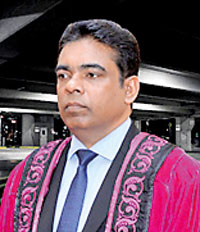Sri Lankan Healthcare System and the Role of ‘Bystander’
View(s):Even though Sri Lanka is a small, lower middle-income country, which is still developing, it claims an impressive health care system. Equal to many upper-middle-income countries in terms of life expectancy and indicators for neonatal, maternal, and mortality rates for children under five years, Sri Lanka appears well-placed to reach universal health coverage (UHC), one of the United Nations’ important Sustainable Development Goals (SDGs).

Dr. B. Sunil S. De Silva, Dean / Senior Lecturer in Nursing, Faculty of Health Sciences, The Open University of Sri Lanka, Nawala, Nugegoda, Sri Lanka.
According to the World Health Organization (WHO) (2019), universal health coverage is a system in which all persons can use the quality promotive, preventive, curative, rehabilitative, and palliative health care services they need, while also confirming that the use of these services do not expose the user to financial hardship. The Sri Lankan health care system offers these services free of charge to every citizen of the country at the point of delivery. However, its overall high standards often direct attention away from certain prevailing gaps that should be addressed if we are to achieve true universality in health care. In reality, many of the country’s households (60%) are forced to spend their own money on surgical necessities, drugs, laboratory tests, specialized treatments, and medical investigations. Hiring or providing an informal caregiver, who is known as a ‘bystander,’ to look after the patient during the hospital stay is not only a significant economic burden for the patient but also for their entire household.
A severe shortage of nurses and support staff in Sri Lanka is one of the major reasons why bystanders are required to look after and provide care to patients admitted to the hospital. According to the Ministry of Health Nutrition and Indigenous Medicine, the total number of nurses in Sri Lanka in 2015 was 42,420. There were 185 nurses per 100,000 population in 2014 and 202 per 100,000 in 2015. In Sri Lankan healthcare settings, many patients who lack resources are seen in a nursing ward, which may not have an inadequate number of nurses. This nursing shortage, combined with a large number of patients, creates a chaotic situation in the hospital setting, where already heavy workloads are increasing, sometimes forcing task-oriented nursing.
A bystander is known as a person who stands near and watches something happen, but who is not directly involved in the event. However, as will become apparent, bystanders in the healthcare settings described in the Sri Lankan context do much more than “stand near and watch something happen”; they provide significant care to the patient. Most of the time in Sri Lanka, a bystander is a relative who endlessly stands by anyone who is admitted to the hospital. He or she is not expected to sit, let alone lie down. Not only do relatives act as bystanders; but many bystanders are now available for hire. Currently, many families shrink in size, and sparing one person from the family is unthinkable to many, so bystanders-for-hire are necessary. Further, some patients do not have close relations or older children who could take on the bystander role. In that context, they have to hire an outside person. Most hospitals will not permit more than one bystander to be with a patient, and that person is almost always busy. These bystanders are with every patient who needs support or informal care for their day-to-day activities, such as personal hygiene and eating, especially in public hospitals. When it applies to palliative care patients who have a life‐threatening illness and need end-of-life care, the role of the bystander is crucial.
In summary, due to the shortage of nurses and support staff in the existing public hospital setting in Sri Lanka, nurses have to focus on task-oriented nursing and do not have time to provide patient-centred, individualised quality care for patients. Hence, most patients need an informal caregiver known as a bystander to help them complete day-to-day activities; this is especially true for palliative care patients who are admitted to these hospitals. These bystanders are either patients’ family members or they are hired. Most families like to keep a family member as a bystander as much as possible due to socio-cultural bonds and religious obligations. This strong bond among family members due to moral and religious obligations is the framework of Buddhism and Eastern societal expectations; affection between the elderly and their loved ones also motivates relatives to serve as bystanders in the wards in the hospital setting. However, the type of bystander and the care they provide are still not properly recognised and evaluated in the Sri Lankan context. It was envisioned that a study in this area would help gather information and provide insight into bystanders and their role, especially since proper informal care service is yet to be developed in Sri Lanka.
Overall, the bystander service needs to be evaluated through the lens of bystanders, nurses and policymakers to explore the advantages and disadvantages of having bystanders in the healthcare system which is currently a neglected area in the Sri Lankan Healthcare system.
HitAd.lk is the best and biggest mobile phone market in Sri Lanka, and we guarantee you will find what you need here from our extensive listing of mobile phones for sale in Sri Lanka. Whether it’s a budget-priced smartphone for communication, or higher end features with advanced connectivity, there are many different options from which to choose from on our site!


